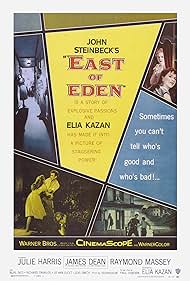Two brothers in 1910s California struggle to maintain the favor of their affectionate but strict, Bible-toting father as an old secret about their long-absent mother comes to light.Two brothers in 1910s California struggle to maintain the favor of their affectionate but strict, Bible-toting father as an old secret about their long-absent mother comes to light.Two brothers in 1910s California struggle to maintain the favor of their affectionate but strict, Bible-toting father as an old secret about their long-absent mother comes to light.
- Won 1 Oscar
- 14 wins & 11 nominations total
Abdullah Abbas
- Townsman at Carnival
- (uncredited)
John Alban
- Townsman
- (uncredited)
Rose Allen
- Townswoman at Carnival
- (uncredited)
José Arias
- Prisoner
- (uncredited)
Frank Baker
- Townsman
- (uncredited)
Barbara Baxley
- Nurse
- (uncredited)
John Beradino
- Coalman at Lettuce Field
- (uncredited)
Joe Brooks
- Townsman at Carnival
- (uncredited)
- Director
- Writers
- All cast & crew
- Production, box office & more at IMDbPro
Storyline
Did you know
- TriviaWhen Adam refuses to accept Cal's money, the script called for Cal to turn away in anger from his father. It was James Dean's instinct to embrace him instead. This came as a surprise to Raymond Massey, who could think of nothing to do but say, "Cal! Cal!" in response.
- GoofsIn 1917, Adam Trask unsuccessfully "invents" the refrigerated railroad car to ship produce. In reality, tens of thousands of such cars were in common use by 1890. (This mistake was also made in the novel.)
- Crazy creditsCards during opening credits: In northern California, the Santa Lucia Mountains, dark and brooding, stand like a wall between the peaceful agricultural town of Salinas and the rough and tumble fishing port of Monterey, fifteen miles away. AND "1917 Monterey, just outside the city limits"
- Alternate versionsThe dispute with shoemaker Gustav Albrecht about the war had been cut from the 1955 dubbed release for Germany and Austria. The viewer only sees Albrecht leaving the fair claiming "Can't I say my opinion?", Cal climbing down the Ferris wheel and following Aaron and Albrecht, some fight in front of Albrecht's house, and the sheriff appearing. The reason for all this remained unclear; the recruiter's speech is cut except for one background line ("Join the army!") when Cal and Abra pass by, and the viewer doesn't even get that Albrecht might be of German descent. In most of today's copies, the missing scenes are included, distinguishable by the German subtitles.
- ConnectionsEdited into The Meadow (2008)
- SoundtracksOh, You Beautiful Doll
(1911) (uncredited)
Music by Nat Ayer
Played when Cal first enters the bordello
Also played when Cal and Abra pass in front of the mirrors
Featured review
Director Elia Kazan's film of John Steinbeck's novel, adapted by screenwriter Paul Osborn, is based on just a portion of that book yet has more plot than it knows what to do with. The picture is heated, occasionally heavy-handed or melodramatic, but features a great cast, gorgeous locations, superb color cinematography from Ted McCord, majestic scoring by Leonard Rosenman--so why isn't it a masterpiece? It is encumbered by a script with too much ground to cover; the story threads and characters are enough for two more pictures. In 1917 Northern California, a genial single father and lettuce farmer--just discovering the merits of refrigeration--juggles his attention and affections between his two sons, one a straight arrow with a steady girl and the other a hellraising hothead. The bad son is determined to find out what's become of his mother, reputed dead but really making a decent living as a madam in nearby Monterey. His clean-cut brother, who harbors deep-seated jealousies, is concerned about the impending war with Germany and his own non-involvement (read: cowardice). At times overstated, and with a showy side that reveals a certain self-consciousness, "East of Eden" could surely do without the Biblical parallels and implications; however, it does give its talented performers exceptionally meaty roles to play. James Dean cuts a dandy presence on the screen; though he sometimes comes off as a junior version of Brando, Dean nevertheless owns the film while conveying a range of hyper-sensitive moods quite compellingly. Richard Davalos, playing Abel to Dean's Cain, perhaps isn't quite in the same league as his co-star, but he's well-cast and looks astonishingly like Dean. Julie Harris, as the nice, decent girl who is attracted to both brothers, does the hand-wringing bit convincingly enough, and her bedside speech near the finale is genuinely moving. Jo Van Fleet won a Supporting Oscar as the boys' intimidating mother, Raymond Massey does solid work as their father, and Burl Ives is the cool-headed local law. Some of the editing is sloppy (especially in the early scenes) and, indeed, the picture seems to begin in the middle of this tale, with bold undercurrents we sense but are not privy to. It's a good film, not a great one, and keeps to the right side of soap opera thanks to forceful interaction, a beautiful production design, and the sweep of grand storytelling. *** from ****
- moonspinner55
- Jun 14, 2009
- Permalink
Details
- Release date
- Country of origin
- Official sites
- Language
- Also known as
- Al este del paraíso
- Filming locations
- Denslow-Morgan-Preston Mansion - 45200 Little Lake Street, Mendocino, California, USA(mansion - burnt down a year after production)
- Production company
- See more company credits at IMDbPro
Box office
- Gross worldwide
- $29,501
- Runtime1 hour 58 minutes
- Color
- Aspect ratio
- 2.55 : 1
Contribute to this page
Suggest an edit or add missing content































